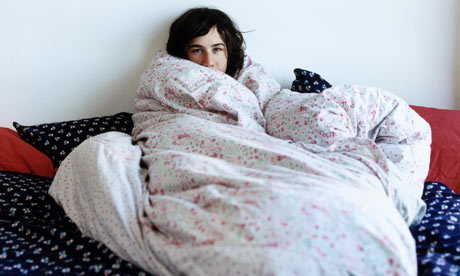
By the end of freshers' week, many students will start resembling pale legions of the undead. All-night drinking, poor diet and lax hygeine standards turn halls of residences and shared housing into vast Petri-dishes incubating disease. Which is why, says Jacqui Jedrzejewski of NHS Direct National Mental Health and Children's Services, "all students should register with a local GP and access additional health support from their university's student support services." Here's how to tackle 10 of the ailments most likely to affect students:
Freshers' flu
Symptoms Headaches, aching limbs, fever, sore throat, cough, lethargy, runny nose.
Treatment Fluids and rest, but if you suspect swine flu, you may be prescribed Tamiflu. "The most likely cause of fresher flu," says Jedrzejewski, "is the convergence of large numbers of people arriving from all parts of the country, or even the world, many carrying germs to which they are immune; other students, though, will have not have had a chance to acquire the necessary immunity."
Depression
Symptoms Lethargy, overwhelming negative emotions, appetite loss.
Treatment Counselling, medication, exercise. Starting university can send students on a rollercoaster of emotions from excitement and a sense of liberation to apprehension and homesickness. "Also, mature students juggle family responsibilities and financial worries with academic work," says Jedrzejewski. Most universities have a campus counselling service, so don't be afraid to ask for help.
Chlamydia
Symptoms Up to 70% of female sufferers (50% of men) show none, but common indicators for both sexes are a burning sensation when urinating and abnormal discharge.
Treatment: Look out for on-campus screening campaigns or visit your GP, who can diagnose it and prescribe anti-biotics. Young Britons have the poorest record for sexual health in Europe and chlamydia, if untreated, can cause infertility. Using condoms can help you avoid contracting it but it can also be transmitted by oral sex.
Glandular fever
Symptoms: Fatigue, sore throat, swollen glands in neck, skin rash.
Treatment: Antibiotics are not effective, so rest, especially for the first weeks of illness, and take plenty of fluids. Known as "the kissing disease" since it is passed by close contact, this chronic condition is debilitating and may disrupt study.
Food poisoning and tummy bugs
Symptoms Diarrhoea, stomach cramps and vomiting.
Treatment In severe cases, lasting longer than four days, a GP will identify the bacteria responsible in a stool sample, then prescribe antibiotics. In milder cases, take plenty of fluids. Prevent spreading germs by washing hands often and keeping kitchens, dishcloths and tea-towels clean. "Accommodation services can assist in sorting out cleaning disputes," says Kathryn Ramsden, head of student wellbeing at Salford University. Most universities will do this for halls of residences.
Alcoholism
Symptoms: Alcohol dependence, frequently getting into alcohol-related trouble and being warned by friends about your intake.
Treatment: Cut down alcohol intake, seeking help from your GP or university if necessary. Excessive drinking can cause cirrhosis of the liver, and is linked to an increase in certain cancers, including that of the bowel. Try not to exceed the recommended weekly units of 21 for a man and 14 for a woman. A small glass of wine, or half a pint of beer is one unit.
Ringworm
Symptoms: circular, itchy rash.
Treatment: Over-the-counter anti-fungal lotion will usually get rid of it, unless it's on the scalp, in which case your GP will prescribe anti-fungal tablets. This highly contagious fungal skin infection is spread by habits such as sharing towels, and beds.
Anaemia
Symptoms: Tiredness, lethargy, irregular heartbeat.
Treatment: Anaemia is caused by iron or Vitamin B12 deficiency. Best remedied by iron or B12 supplements, and eating red meat and green vegetables. Ramsden says: "Recognise the effects of poor nutrition on mood, as the 'low' of anaemia can be confused with depression."
Chilblains
Symptoms: Small, irritating spots on extremities.
Treatment: Over-the-counter creams, such as calamine lotion. An extreme reaction to cold, chilblains affects one in 10 people but your chances of getting them will be upped considerably by standing in kebab queues on winter nights.
Meningitis
Symptoms Aching neck, dislike of bright lights, shivering, vomiting and, for meningococcal septicaemia, a rash which is visible after pressure is applied. If worried, call the Meningitis Research Foundation's 24-hour helpline (080 8800 3344), or seek emergency medical help. Speedy intervention is essential.
Treatment Antibiotics administered in hospital. Meningitis is relatively rare but extremely serious and universities advise students to be immunised against meningitis C, following outbreaks on a number of UK campuses in recent years.

